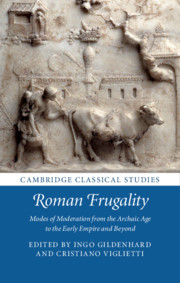Book contents
- Roman Frugality
- Cambridge Classical Studies
- Roman Frugality
- Copyright page
- Contents
- Figures
- Contributors
- Acknowledgements
- Note on Translations
- Abbreviations
- Introduction
- Chapter 1 ‘Frugality’, Economy and Society in Archaic Rome (Late Seventh to Early Fourth Century BCE)
- Chapter 2 From Licinius Stolo to Tiberius Gracchus: Roman Frugality and the Limitation of Landholding
- Chapter 3 Frugality as a Political Language in the Second Century BCE: The Strategies of Cato the Elder and Scipio Aemilianus
- Chapter 4 Smallholding, Frugality and Market Economy in the Gracchan age
- Chapter 5 Frugalitas, or: The Invention of a Roman Virtue
- Chapter 6 Frugality, Building, and Heirlooms in an Age of Social Mobility
- Chapter 7 From Poverty to Prosperity: The Recalibration of Frugality
- Index Locorum
- General Index
- References
Chapter 2 - From Licinius Stolo to Tiberius Gracchus: Roman Frugality and the Limitation of Landholding
Published online by Cambridge University Press: 26 June 2020
- Roman Frugality
- Cambridge Classical Studies
- Roman Frugality
- Copyright page
- Contents
- Figures
- Contributors
- Acknowledgements
- Note on Translations
- Abbreviations
- Introduction
- Chapter 1 ‘Frugality’, Economy and Society in Archaic Rome (Late Seventh to Early Fourth Century BCE)
- Chapter 2 From Licinius Stolo to Tiberius Gracchus: Roman Frugality and the Limitation of Landholding
- Chapter 3 Frugality as a Political Language in the Second Century BCE: The Strategies of Cato the Elder and Scipio Aemilianus
- Chapter 4 Smallholding, Frugality and Market Economy in the Gracchan age
- Chapter 5 Frugalitas, or: The Invention of a Roman Virtue
- Chapter 6 Frugality, Building, and Heirlooms in an Age of Social Mobility
- Chapter 7 From Poverty to Prosperity: The Recalibration of Frugality
- Index Locorum
- General Index
- References
Summary
Republican Rome saw a range of laws designed to moderate the acquisition of wealth, and this chapter focuses on two such measures, the Lex Licinia de modo agrorum (367 BCE) and Tiberius Gracchus’ agrarian law of 133 BCE. In our later sources these two historical moments tend to be conflated, and the chapter begins by confronting the ensuing methodological problems. A critical review of the previous scholarship establishes that whereas the pre-Gracchan limit applied to all landholding not just public land, Gracchus, who was interested in reclaiming public land for distribution rather than putting a limit on elite wealth, revived the earlier limit, but applied it only to public land. These findings serve as basis for a discussion of the law carried by the tribune C. Licinius Stolo in 367 BCE, including the identification of an ‘ethos of frugality’ in mid-republican Rome which was meant to prevent individuals from accumulating excessive material resources. The final part of the chapter traces the history of the tension between the pursuit of personal enrichment and the interest of the wider community to keep such pursuits in check – an endeavour rendered increasingly difficult given Rome’s foreign conquests.
Keywords
- Type
- Chapter
- Information
- Roman FrugalityModes of Moderation from the Archaic Age to the Early Empire and Beyond, pp. 159 - 191Publisher: Cambridge University PressPrint publication year: 2020
References
- 2
- Cited by

